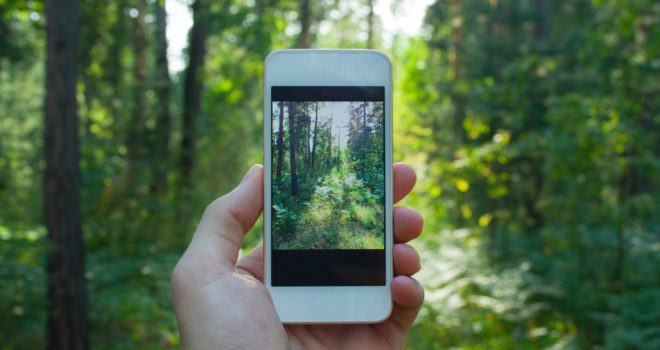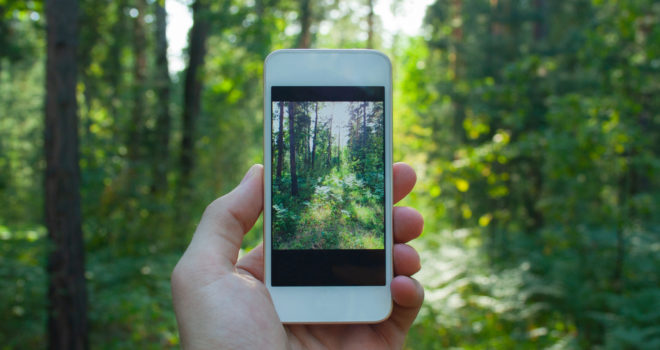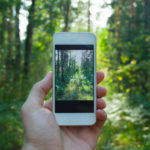In 2007, the first iPhone was launched. It was the first affordable smartphone that boasted a growing App Store whose streamlined applications set the stage for a complete overhaul in the ways we viewed entertainment, commerce, and social interaction.
With the swipe of a finger, we latched on to fledgling companies like Facebook, Twitter, Amazon, and a newly redesigned digital video streaming version of Netflix. Most of the apps were cheap (even free), and the devices themselves were sleek, powerful, and had the potential to make our lives remarkably efficient. In the palm of our hands, the entire world flitted across our screens through pixels and power chords.
And we attempted to make that world fit into our heads.
The problem was, and still is, that in order to fit the fullness of human knowledge into our minds, we had to get rid of a few things in order to make room – namely our memories, our self-control, and our souls.
Outsourcing Our Memories
Since the earliest of civilizations, man has desired to cultivate their God-given gift of memory. Storytellers shared their tribal myths with their young. Mothers passed down recipes and healing mixtures of herbs to the next generation. Teachers ensured that their communities would survive by educating each member in the importance of virtues through time-honored traditions, celebrated rites of passage, and generational expectations. As a result, culture was established within these communities, a culture based on a collective memory of values.
Over time, these memories grew as the population of the communities did. While the variations of experiences multiplied by conquests, technological advances, and globalization, the collective memory of the people remained intact as each nation’s culture remained linked to its history.
When all of those experiences became accessible through screens, he collective knowledge of one’s history, the connection to our cultures, an ultimately our memories became fragmented to the point that we could no longer recall how to spell certain words, which roads to take to get to an unknown destination in our towns, nor remember our best friend’s phone number.
It didn’t take long for us to notice that something about this new technology disturbed our inner thought processes. Psychologists did their best to gather research on this relatively new phenomena and, while data was sparse, the proof was apparent. In 2010, journalist Nicolas Carr published his book, The Shallows: What the Internet is Doing to Our Brains and unearthed a mountain of proof that rallied against the juggernaut of digital delights. He wrote, “Culture is sustained in our synapses…It’s more than what can be reduced to binary code and uploaded onto the Net. To remain vital, culture must be renewed in the minds of the members of every generation. Outsource memory, and culture withers.”
Carr’s words ring truer now more than a decade after he penned them. Our memories, and by extension, our cultures, are stifled because our minds no longer embrace the wholeness of knowing. We no longer need scholars nor the wisdom of our elders because any question we have about the world can be answered by “just Google it.” As a result, we fall further into ourselves seeking solace in the flickers of our Pandora’s boxes.
Sacrificing Self-Control
Once our memories and communities are removed from the equation, our souls are placed in a fight or flight situation with itself. In spending time with one’s self, the soul knows not what to do with its desires. As Fulton Sheen once wrote, “Every human must love or go crazy, because no man is sufficient for himself.” As a result of his removal of self from community, he latches on to his digital community seeking a shadow replacement for flesh and blood interaction. He sends tweets to people he’s never met in person. He posts pictures of himself for anonymous “friends” to “like.” He craves content, both producing it and scrolling endlessly through his peers’ accounts hoping their comments will satisfy his communal cravings like a slot machine does a gambling addict.
It inevitably does not, but his addiction continues because not only are his behaviors accepted on a global scale, but encouraged. Every aspect of his life, be it the middle school he attends, his job, his political views, even his religion, all try to meet him in the digital world first because he’s constantly there, even when he’s not. A buzz hums in the back of mind with the ever-present thought of a global conversation that he is constantly missing out on if he isn’t logged on. With a swipe of a screen, he satisfies his cravings, but sacrifices himself and his God in the process, so that others can have his attention.
When this happens, he no longer controls his thoughts, the Internet does. And where thoughts take root, actions follow.
The Dark Night of the Modern Soul
When I wrote my book Detached: Put Your Phone in Its Place in 2017, ten years had passed since the release of the iPhone 1. The research at that time showed that the average American spent 3.5 hours on screens. Psychologists discovered back then that those who spent higher than average amounts of time on their screens were more likely to struggle with mild to severe depression.
Fast forward to 2019 where the number of depressed people began to climb higher prior to the arrival of a global pandemic. Once the Covid-19 outbreak hit, everyone closed their doors and opened their routers so as to connect themselves “all in” to their devices. Every industry went digital, and as a result, data shows that that the 2022 average screen time total has boomed to 6 hours and 57 minutes. Combine that with the psychological data and we find that the number of depressed individuals has tripled.
Covid might have been the fire that burned us all, but the gasoline upon which the blaze was kindled was, and still is, our screens.
Man is in a constant state of suspension between time and timelessness. On the one hand, he exists and is therefore relegated to move within the world, understanding it through the senses. On the other, his soul spends less and less time caught in a daydream of contemplation in which he drifts into invisible spiritual realms. Like a tug of war, the soul is being pulled constantly toward heaven and hell while it remains in its earthly existence.
As Catholics striving to save the Catholic culture, it is our duty and honor to resist the screens that distract us from attaining the fullness of grace that God offers us through prayer, community, and contemplation. While devices can (and should!) be used as necessary tools to make our lives happier and holier, that simply isn’t the case for most of us who have sensed the dark power that our devices have over us.
G.K. Chesterton once wrote that “it is the paradox of history that each generation is converted by the saint who contradicts it most.” It is my hope that Catholics be at the forefront of this fight against digital addictions through various practices in the virtue of prudence. Yes, we need screens to survive in the world, but we don’t need them to achieve our salvation.
What aspects of your digital lives need to change so that your soul can be free to know, love, and serve God to a higher degree?
✠












